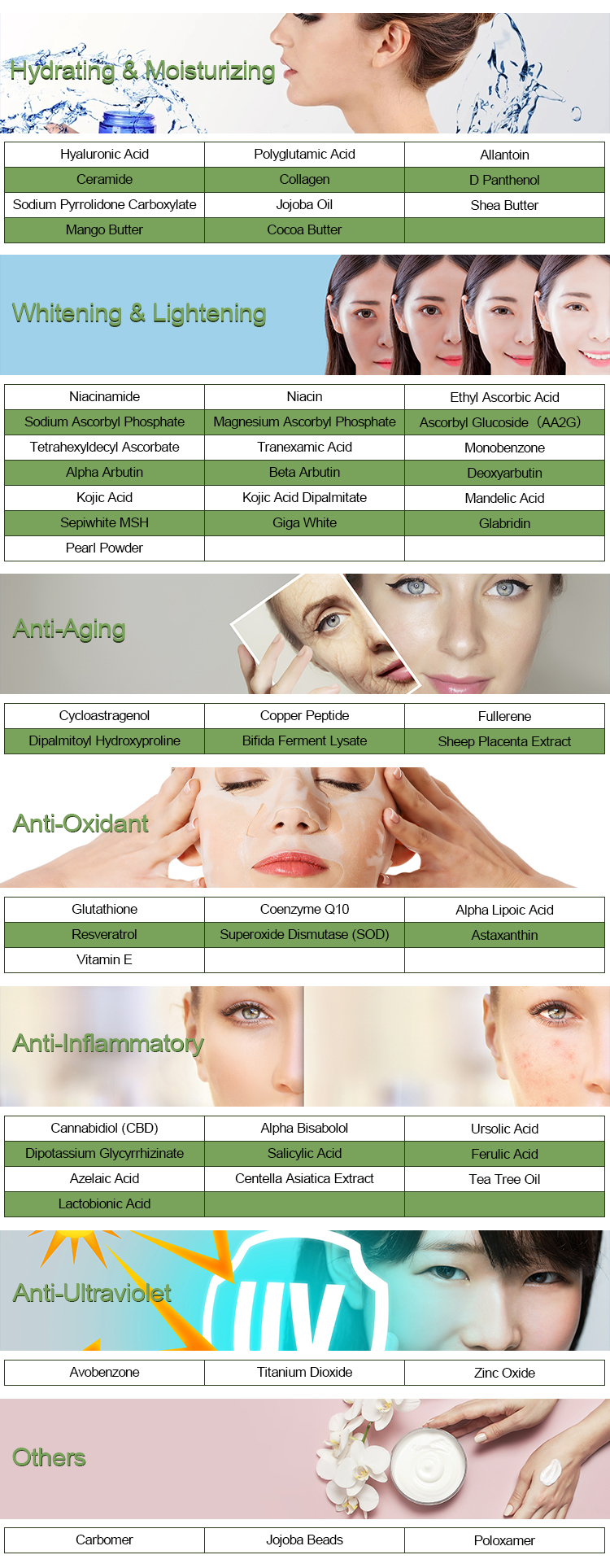Nicotinamide, also known as niacinamide or vitamin B3, is a water-soluble vitamin and an essential nutrient for the human body. It plays a crucial role in various biochemical processes, and its application extends to several areas, including:
Applications of Nicotinamide
Skin Health:
- Topical Skincare: Nicotinamide is a common ingredient in skincare products due to its ability to improve skin health. It can help reduce acne, inflammation, and redness. It also assists in maintaining the skin’s moisture barrier, which is vital for preventing water loss and maintaining healthy skin.
Dermatology:
- Treatment of Skin Conditions: Nicotinamide is used in the treatment of certain skin conditions like rosacea, eczema, and psoriasis due to its anti-inflammatory and moisturizing properties.
Cancer Prevention and Treatment:
- Skin Cancer Prevention: Some studies suggest that nicotinamide may help reduce the risk of certain skin cancers, particularly non-melanoma skin cancers, when taken orally.

Neurological Health:
- Alzheimer’s Disease: There is ongoing research into the potential use of nicotinamide for Alzheimer’s disease due to its role in supporting brain health.
Metabolic Health:
- Diabetes Management: Nicotinamide can be used in the management of type 1 diabetes by helping to preserve beta cell function in the pancreas.
Cosmetic and Anti-Aging Products:
- Nicotinamide is often included in cosmetic and anti-aging products due to its ability to improve the appearance of fine lines and wrinkles.
Energy Metabolism:
- Nicotinamide is a precursor to coenzymes NAD (nicotinamide adenine dinucleotide) and NADP (nicotinamide adenine dinucleotide phosphate), which are essential for energy metabolism in cells. These coenzymes play a vital role in various cellular processes, including the citric acid cycle and oxidative phosphorylation.
DNA Repair:
- Nicotinamide is involved in DNA repair processes, helping to maintain the integrity of genetic material in cells.
Immune Function:
- Nicotinamide may support immune function and help reduce inflammation, which can be beneficial for overall health.
Mood Disorders:
- Some research suggests that nicotinamide may have a role in mood regulation and the management of conditions like depression and anxiety.
It’s important to note that while nicotinamide is generally safe when taken at recommended doses, high doses can cause side effects. It’s advisable to consult a healthcare professional before using nicotinamide supplements, especially at high doses or for specific medical conditions. Dietary sources of nicotinamide include meat, fish, nuts, and certain vegetables, so a balanced diet can provide an adequate supply for most people.
The negative impact of the Nicotinamide
Nicotinamide, also known as niacinamide or vitamin B3, is an essential nutrient that plays a crucial role in various biochemical processes in the human body. While it is generally considered safe and necessary for health, there can be negative impacts associated with nicotinamide under certain circumstances:
Allergic Reactions: Some individuals may be allergic to nicotinamide and could experience allergic reactions such as skin rashes, itching, or swelling.
Digestive Issues: In rare cases, high doses of nicotinamide can lead to stomach upset, nausea, vomiting, and diarrhea.
Liver Toxicity: Extremely high doses of nicotinamide may potentially lead to liver toxicity. However, such high doses are not typically obtained through diet alone.
Gout Flare-Ups: Nicotinamide can increase the production of uric acid, which may trigger or worsen gout symptoms in susceptible individuals.
Interactions with Medications: Nicotinamide can interact with certain medications. For example, it can interfere with the effectiveness of tetracycline antibiotics.
Possible Impact on Glucose Regulation: Some research suggests that very high doses of nicotinamide might affect glucose regulation in individuals with diabetes. However, more research is needed in this area.

It’s important to note that these negative impacts are typically associated with high doses of nicotinamide, which are not typically achieved through a regular diet. In fact, nicotinamide is considered an essential nutrient, and a deficiency can lead to a condition known as pellagra, which includes symptoms like skin rashes, digestive problems, and neurological issues.
For most people, obtaining nicotinamide from a balanced diet is sufficient to meet their nutritional needs without experiencing negative side effects. However, if you are considering taking nicotinamide supplements or have concerns about its potential impact on your health, it’s advisable to consult with a healthcare professional to determine the appropriate dosage and monitor any potential side effects.
